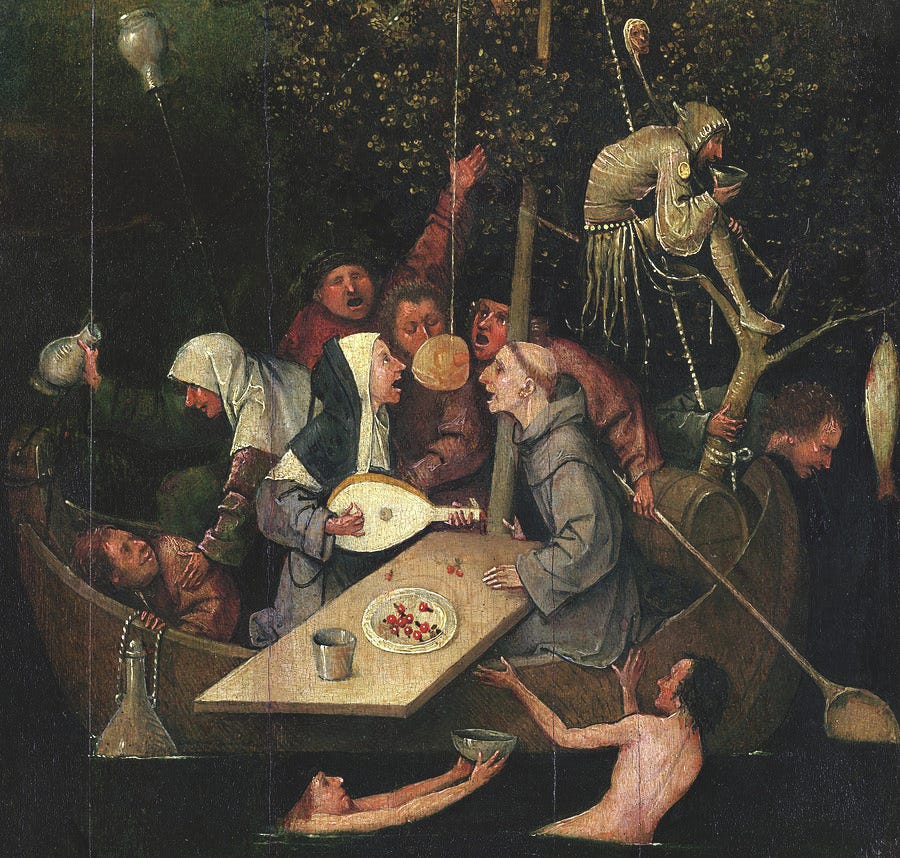Ship of Fools
A group photo of Biden's senior leaders in his administration could be easily mistaken for Hieronymus Bosch's painting, Ship of Fools.
I picked up a story from X this morning that detailed, in what can only be described as a brilliant fashion (sarcasm), how a woman in Georgia was arrested for calling the police on squatters in her own home. The squatters were ordered out, they left, but when the homeowner returned to start renovations, she found they had moved back in and changed all the locks again. As the police hauled her away, the media surrounded her, admonishing her to "check her privilege" for calling the police on someone less fortunate than herself, who had resorted to squatting.
While researching this situation, I came across another article from June of this year about a woman in Germany who was punished for "defaming" a "migrant" man—one of nine who had gang-raped a 15-year-old girl in a Hamburg park—by calling him a "disgusting pig" on social media. The rapist received a suspended sentence and served no time in jail, whereas the woman faced jail time. Apparently, in Germany, calling someone an "idiot" on social media can lead to a prison sentence of up to two years.
These cases led me to reflect on similar situations in our country where victims are punished while the criminals go free, highlighting how upside-down things can seem. From the refusal to enforce laws to arresting and prosecuting those who act rationally (and often heroically) to protect others, there's a noticeable imbalance.
A few years ago, while living in the UK, we traveled to the Musée du Louvre in Paris with our boys who had come to visit. I recall being mesmerized by Hieronymus Bosch's painting, Ship of Fools, which vividly captures Plato's powerful allegory from The Republic (Book VI) which offers a profound critique of governance, leadership, and democracy.
As I sat down to compose this post, given the Biden administration is filled with talentless and clueless characters and loons who were chosen for reasons far divorced from talent and competency, I concluded how easy it would be to mistake Bosch’s painting for a group photo of Biden’s senior levels of government.
In Plato's allegory, a ship represents the state or society, with the shipowner symbolizing the general population. While the owner has rightful claim to the ship, they lack the expertise to navigate it, making them susceptible to manipulation by persuasive but unqualified individuals. This mirrors Plato's view of the average citizen in a democracy: well-meaning but ill-equipped for governance.
The crew of the ship stands for politicians or leaders within democracy, depicted as quarrelsome, self-serving, and power-hungry, more focused on gaining control than on the welfare of the passengers or the ship's direction. This portrayal critiques the political competition in democratic systems, where popularity often trumps competence.
The true navigator in the allegory symbolizes the philosopher, possessing the knowledge and wisdom to guide the ship safely, yet this figure is dismissed and ridiculed by both the crew and the shipowner for not engaging in their manipulative tactics. This reflects Plato's belief that society often undervalues philosophical wisdom in governance.
Plato’s allegory teaches several lessons. It critiques democracy for being easily swayed by those without true merit or virtue, noting that democratic systems often reward those who are skilled in persuasion rather than those who possess genuine knowledge or virtue. It emphasizes the importance of philosophers in leadership, arguing they are best suited to lead due to their commitment to truth and justice. Lastly, it warns against the perils of ignorance and not valuing expertise in leadership.
In essence, Plato’s Ship of Fools serves as a cautionary tale about the dangers of entrusting power to those without the necessary wisdom and moral integrity, reinforcing his argument for philosopher-kings—leaders dedicated to the common good with the intellectual and ethical qualities needed for effective governance. This allegory remains a timeless commentary on the challenges of leadership and the responsibilities of both rulers and citizens in the pursuit of a just society.



We are, without question, suffering under this maladministration, populated at every level by incompetent, dangerous fools.
Caveat: "fools" implies these people don't know what they're doing, but these fools know very well what they're doing: destroying the country.
Insightful article, Michael.
In the basement of the Jefferson Memorial in Washington a little gem of wisdom he authored is hidden away in a small display that reads
"If a nation expects to be ignorant and free, in a state of civilization, it expects what never was and never will be."
This is in your national capital, where 95% of the population voted for Hillary, Biden, Harris and the crackhead mayor, Marion Barry, year after year. Where 50% of the inner city highschool graduates can't read their diplomas.